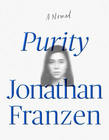After delighting in Freedom and Corrections, of course, I was hungry for Jonathan Franzen’s new novel, Purity.
Unless you’ve been hiding under a rock in Durgapur, you know that Franzen is the most well known American writer today.
Franzen has long eclipsed Stephen King on the North American authorial fame meter.
Great Breadth of Purity
Like Freedom and Corrections, Purity is a hefty work.
Both in pages (563) and content.
Besides the eponymous Purity aka Pip, the book pores over the lives and times of five others (Andreas Wolf, Tom Aberant, Leila, Anbabel and Annagret).

Our 23-year-old Pip and the Internet outlaw Andreas are the more colorful ones.
A mess in many ways, Pip struggles with diverse baggages, social, emotional and financial.
Andreas is a wildly driven egocentric raging mess who finds emotional release in two complementary outlets, masturbation/sex and Internet.
The book starts in present day Oakland (California) but goes back decades to Philadelphia, East Berlin, New York and wherever Franzen’s fancy takes him.
Communist Germany, present day Bolivia, student debt, pornography, poverty, online surveillance, leaking state secrets, renewable energy, rote work, non-profit scams, squatting, morality and what have you get plenty of ink in the book.
At times, I wonder if Franzen left anything out.
In the days of yore, before knowledge became highly specialized and Man started knowing more and more about less and less, there were philosophers who could lay claim to have a solid grip on the entire domain of knowledge.
Franzen is the rare polymath among modern novelists and glides over so many subjects smoothly.
The words just pour out like fast-running pristine water down an unsullied mountain side.
But it’s the Internet that draws Franzen’s particular scrutiny in Purity via the character of Andreas Wolf (a seeming stand-in for Julian Assange) and his Sunlight Project.
Clearly, Franzen is not as enamored with the ‘endless magic’ of the Internet like the remaining seven billion denizens of Planet Earth.
Few contemporary American novelists paint on as wide a canvas as Jonathan Franzen.
One secret of the author’s popularity – By touching upon and throwing out so many elements, Franzen is easily able to establish a connection with his legions of readers. Every reader is sure to find at least one strong element in Franzen’s books that he identifies with himself completely.
Franzen is holding up a mirror and when a reader seems himself in a corner of the panorama he’s hooked forever.
The beauty of fine writers like Jonathan Franzen is how beautifully they capture the zeitgeit of our present times.
The discontent, restlessness, constant surveillance, endless free porn, financial insecurity and addiction to the seductive layers of the Internet come to life in a rich manner in Purity.
Franzen is on a more sure footing, more convincing, in the present than when he goes back into the past.
One can easily read Purity as a lengthy social commentary on modern life without any of the prescriptions for a better life.
If there’s one thing wise writers like Franzen, Vidal, Mencken and other pragmatic realists know and carefully avoid, it’s that there are no panaceas for the world’s ills.
Hence these remarkable word-doctors catalog but don’t prescribe.
Given all that passed before it, Pip’s happy ending and her mother’s easy acquiescence to the financial suggestions seemed contrived and more than a little unconvincing.

You must be logged in to post a comment Login